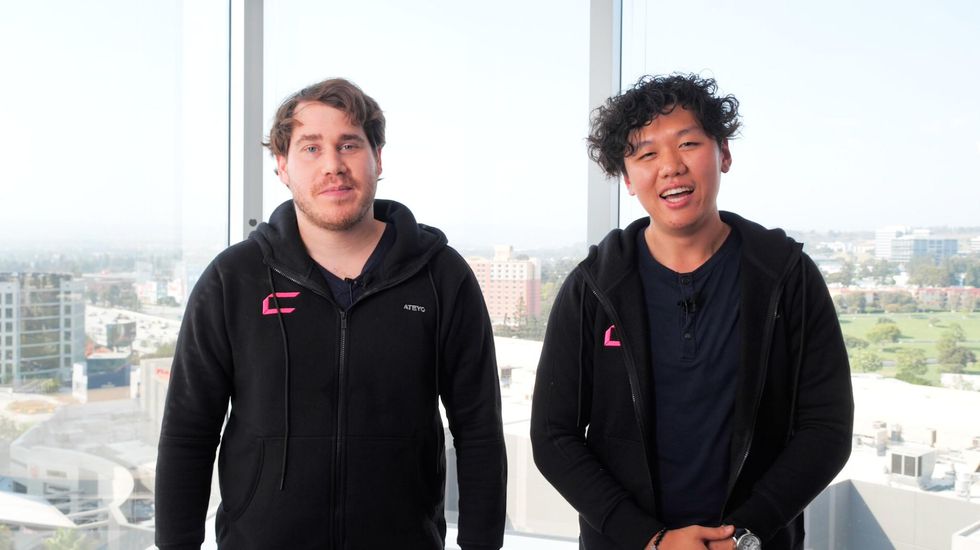Infinite Canvas' $2.8M Plan to Build a Creator Market in the Metaverse
Samson Amore is a reporter for dot.LA. He holds a degree in journalism from Emerson College. Send tips or pitches to samsonamore@dot.la and find him on Twitter @Samsonamore.

Gaming startup Infinite Canvas is banking big on the rise of the metaverse and the value of user-created content in video games as it launches its business with $2.8 million in pre-seed funding.
The metaverse is basically a more interactive version of the internet driven by user-generated content. It could become the main way we communicate and live online -- Facebook chief Mark Zuckerberg recently told The Verge he wants Facebook to become a metaverse-focused company. Xbox boss Phil Spencer also said Microsoft is taking cues from social media like TikTok to determine what user-generated content to target in games.
Infinite Canvas was founded earlier this year by Tal Shachar — former chief digital officer at esports team Immortals Gaming Club — and President Sebastian Park, who was previously the vice president of esports for NBA team the Houston Rockets.
The pre-seed round was led by Los Angeles-based Lightshed Venture Partners. New investors, including San Francisco-based Bitkraft Ventures, Emerson Collective, Day One Ventures and Crossbeam, also participated.
Shachar told dot.LA the $2.8 million will allow Infinite Canvas to expand its staff from 10 people, pay its content creators, invest in more content and marketing, and explore the potential of the metaverse.
The term is credited to writer Neal Stephenson, who defined it as "a convergence of physical, augmented, and virtual reality in a shared online space."

Video game publishers are beginning to invest more in platforms that let hardcore gamers use their content to create new in-game experiences. Studios will open their IP to players, who can then sell what they create (maps, items, skins, etc.) on the game's marketplace for the studio to take a cut. PC gaming titan Valve Corp. got in on this early with Steam Workshop, and Sony's been doing this since 2012.
"That's something that's increasingly happening where big games and big publishers are adding to that capability," Shachar said. "But there's also more publishers and studios launching games that from day one are built around users creating content."
Shachar wants Infinite Canvas to capitalize on a new, younger demographic of players and creators. The coronavirus pandemic caused a huge jump in people playing games. "Roblox" has 43 million daily active users and it's estimated that half of all U.S. kids have a Roblox account. "Fortnite" has over 350 million monthly players and generated $5.1 billion in revenue last year. These numbers are only expected to grow.
"We partner with these creators that are building experiences on various gaming platforms such as 'Roblox,' and we provide capital, technology optimization, expertise and guidance, in addition to marketing support, in exchange for effectively a stake in the revenue that is produced by these experiences," Shachar said.
On YouTube, it's pretty simple to get paid if you make videos and have a strong follower base -- sign up for a creator account, get monetized and then let the cash roll in along with the views. But for gamers who are creating immersive worlds and challenges inside a game, being paid isn't guaranteed -- unless the creator also makes a video or live stream.
"We are just at the beginning of seeing what the metaverse market opportunity can be," Lightshed Ventures partner Rich Greenfield said in a statement Monday. "While the path to monetization is clear on platforms like YouTube, in virtual worlds Infinite Canvas is pioneering a network that will unite creators, players, and content partners to enhance the earning power of the talent building new virtual empires."
Infinite Canvas wants to build a network of popular creators making in-game content and unite them with advertisers and brand partnerships. As creators become monetized for their in-game work, Infinite Canvas will take a cut of the revenue.
"Creators need support, infrastructure, tools and promotion to grow and connect with their community. At Infinite Canvas, we want to support those creators building the future," Shachar said. "We think creating an organization that combines all of these types of people, players and IP holders can help grow the community and take the metaverse to new horizons, while unlocking earning potential for everyone."
The startup has seven content creators signed on as partners so far, including Anthony "RussoPlays" Russo, who has 1.8 million YouTube subscribers and gaming duo Terabrite Games, which has roughly 1.4 million subscribers.
Infinite Canvas is planning on courting more influencers and celebrities to give it a boost, a move that's worked for other publishers. Last year, a Lil Nas X concert in "Roblox" racked up about 35 million viewers.
Holding virtual concerts inside "Fortnite" was a new move for Epic Games at the beginning of the pandemic but it drove hundreds of millions of people into in-game events after signing pop hitmakers like Travis Scott and Ariana Grande to do virtual concerts. Scott's concert in April attracted over 12 million viewers, and since then Epic's made the in-game shows a regular series.
Shachar said Infinite Canvas would consider using its platform to host in-game events in addition to other content. "We see hosting events inside of experience as one form of entertainment that's possible on the platform," Shachar said. He added Infinite Canvas will also host "more traditional gameplay (that) could be people just hanging out and having a good time or folks having concerts inside of these experiences."
- Bitmoji Paint is Snap's Latest Collaborative Game - dot.LA ›
- Metaverse Comes to Santa Monica With FlickPlay - dot.LA ›
Samson Amore is a reporter for dot.LA. He holds a degree in journalism from Emerson College. Send tips or pitches to samsonamore@dot.la and find him on Twitter @Samsonamore.



 Image Source: Revel
Image Source: Revel
